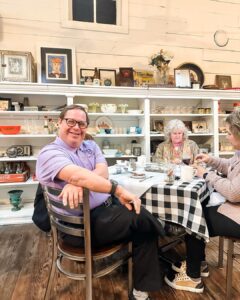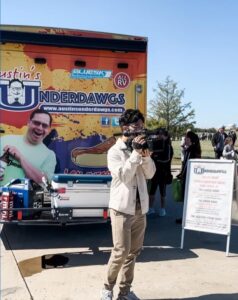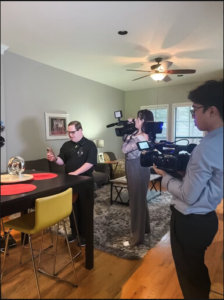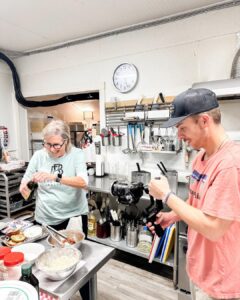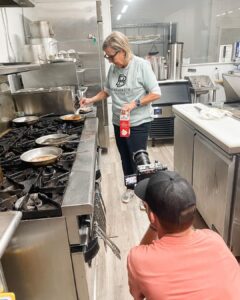What does it mean to have “Expectations, not Limitations?” According to our students, it means Austin Underwood.
Created by students in the Documentary Production course and presented by Film, Television and Digital Media, “Underdawgs” follows the story of local Down syndrome advocate Austin Underwood. Underwood is an adult living with Down syndrome and a small business owner of Austin’s Underdawgs food truck. Together with his mother, Jan, they empower those with intellectual differences to achieve independent living and career opportunities through their non-profit organization, The Each and Everyone Foundation.
It Starts in the Classroom
Each class starts a little differently, but the core of the Documentary Production course is the same: students must plan and execute a documentary in a semester, a mere 15 weeks.
“The biggest challenge I faced was communicating with each team to see where they were on that week’s assignment,” said Noelle Siwek ’24, the film’s producer. “It was hard only meeting once a week because you weren’t able to physically see what work had been accomplished throughout the week.”
The process also helped the students better understand what it means to communicate across differences. Not only in terms of time but perceived ability as well. Two of the documentary’s stars are Underwood and his fiancé Jenny Stone, both adults living with Down syndrome. Some would consider this a challenge, but the crew saw this as an opportunity.
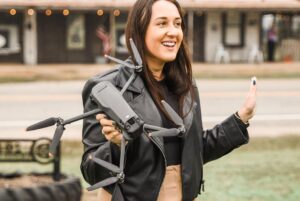
Brie Kirsch ’23, film director, showcasing the drone used for overhead shots of Mingus, TX.
“We just really wanted to be their friends,” said Brie Kirsch ’23, the film’s director. “When we were shooting their interviews, we made sure we were conducting them conversationally so that they would feel comfortable and natural telling their stories.
“We would do the same for anyone. Right off the bat, we were committed to showing them respect and to listening to them, and I think as a result it created meaningful relationships and mutual respect.”
Students take over all the roles, from writing to production. However, it looks slightly different than the traditional film set, where a script is at least partially available before filming.
“One of the biggest differences between writing a documentary and writing a traditional screenplay is that you’re not writing it beforehand but writing it as you go and as you gather more materials. A script is being created primarily with the use of a transcript and archival videos and photos in order to create a narrative,” said Victoria Woodworth ’24, the film’s writer and Schieffer Dean’s Ambassador.
Grows to the Community
At the core of the teaching of the documentary course is a way to inspire students to use their talents in film to highlight advocacy and community engagement. Film can help educate and inspire audiences about the communities in which they live.
“Teaching documentary production classes is such a fulfilling part of my role at TCU,” said Charity Robinson, instructor. “I love watching students use their talents to create advocacy films highlighting important work happening in our community. This group was so inspired by Austin, Jenny and Jan and we were fortunate to share the story of how they are empowering those with intellectual differences to pursue independence and meaningful employment.”
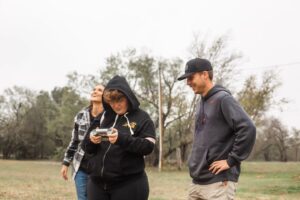
Victoria Woodworth ’24, film writer, manning the drone on site in Mingus, TX.
Students get the opportunity to immerse themselves within their community in a way that translates to the film but also changes their perspectives. These one-of-a-kind experiences help our students become ethical leaders and responsible citizens in the global community.
“My single best memory was going down to Mingus, TX with the director, director of photography, and camera operator to get footage of Beneventi’s and the little houses,” said Woodworth about her experience. “We worked with drones and engaged with a lot of people involved in Austin’s life, and we enjoyed a great dinner courtesy of Jan Underwood.”
And Inspires Beyond
Speaking with the students in this course, they homed in on the importance of telling not just any story, but Austin’s story. They were so inspired by who he was and the work that he was doing within the community.
“This story is so important to tell because I think there is a lack of education for our society in terms of the special needs community,” said Siwek. “I think people are afraid to talk about the topic and don’t know how to treat people with special needs because there has been such a separation between those who are and aren’t involved with someone who has special needs. The Underdawgs documentary is evidence that when we turn our “I can’t” to “I can” heads are turned and what society deems as unachievable, is accomplished.”
Watch the film premiere in person 6 p.m., Monday, Jan. 29, in the BLUU Auditorium. The premiere will be followed by a panel discussion engaging they community on how they can help to empower those with intellectual differences within their spheres of influence.

